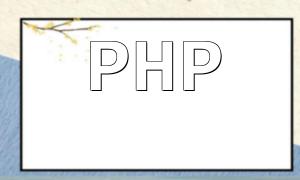In PHP development, writing high-quality code is essential for improving the maintainability of projects and team collaboration. This article will share methods and tips for optimizing PHP coding standards to help developers create top-notch code.
When naming variables, functions, classes, and files, it's important to follow consistent naming conventions. It's recommended to use camelCase for variables and functions, and PascalCase for class and file names. For example:
$myVariable; // Variable naming
function myFunction() {} // Function naming
class MyClass {} // Class naming
To improve code readability, ensure proper indentation and consistent alignment. It's suggested to use four spaces for indentation and avoid using tabs.
if ($condition) {
// code here
} else {
// code here
}
Good comments and documentation help other developers understand your code logic. Use docblocks to describe the function and parameters of classes and functions. For example:
/**
* Calculate the sum of two numbers
* @param int $num1 First number
* @param int $num2 Second number
* @return int The sum of the two numbers
*/
function sum($num1, $num2) {
return $num1 + $num2;
}
Constants should be named in uppercase with underscores, and magic constants (such as __DIR__, __FILE__) should follow the same convention.
define('MAX_NUMBER', 100); // Constant naming
echo __FILE__; // Usage of magic constants
Global variables increase code complexity, making it harder to debug and leading to potential naming conflicts. Therefore, try to avoid using global variables, and instead use class properties and methods.
Good error handling and exception catching mechanisms help improve code robustness. Use try-catch statements to catch exceptions and design appropriate exception classes for different error types.
try {
// Code that may throw an exception
} catch (Exception $e) {
// Handle the exception
}
Using the correct data types and implementing validation mechanisms are crucial for ensuring code security and reliability. In PHP, you can use type hinting to specify the parameters and return types of functions. Additionally, ensure proper validation of user input to prevent malicious attacks and invalid data input.
function calculateSum(int $num1, int $num2): int {
return $num1 + $num2;
}
Code reusability is key to improving development efficiency. Encapsulate common functionality into functions or methods to avoid redundant code. Additionally, you can use namespaces to organize your code and avoid naming conflicts.
namespace AppUtils;
function calculateSum(int $num1, int $num2): int {
return $num1 + $num2;
}
By following these PHP coding standards, you can significantly improve the quality and maintainability of your code. Remember, standardized coding practices not only enhance code quality but also improve development efficiency and provide a solid foundation for team collaboration.









